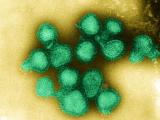Mar 3, 2010 (CIDRAP News) – The US Advisory Committee on Immunization Practices (ACIP), at a meeting last week, heard a report about the high-dose influenza vaccine that was recently approved for people 65 and older but voiced no preference for its use in that age-group.
The vaccine, made by Sanofi Pasteur, was approved by the Food and Drug Administration in December. It contains four times as much antigen as standard-dose flu vaccines. The aim is to increase the chance of a protective immune response in elderly people, who respond less well to standard-dose vaccines than younger people do.
Yesterday the Centers for Disease Control and Prevention (CDC) published the ACIP's "provisional recommendations" for flu prevention and control, a brief preview of the full recommendations, due out in June. The short statement noted that the vaccine, called Fluzone High-Dose, will be available this fall, and added:
"Studies are underway to assess the relative effectiveness of Fluzone High-Dose compared to standard dose inactivated influenza vaccine, but results from those studies will not be available before the 2010-11 influenza season. The ACIP has not expressed a preference for Fluzone High-Dose or any other licensed inactivated influenza vaccine for use in people age 65 and older."
(As reported previously, the ACIP's major action at the meeting was to recommended flu vaccination for all adults, meaning that everyone except babies younger than 6 months is now included in the target groups for immunization.)
William Schaffner, MD, the National Foundation for Infectious Disease's liaison to the ACIP, told CIDRAP News that the committee had good reasons not to explicitly recommend the vaccine for next season.
Such a recommendation "would've been a big surprise, for several reasons," said Schaffner, who is chairman of the Department of Preventive Medicine at the Vanderbilt University School of Medicine in Nashville. "One, it's a brand-new vaccine, and though the study to show it was at least as good as standard vaccines . . . was a solid study, they want to give it some time in the field.
"Number two is that though this [Sanofi] is a large company, if you express a preference, all of a sudden the demand on that company's manufacturing and delivery capacity would be huge, and nobody wants to do that." He said it could lead to supply problems.
With several other flu vaccines approved for adults, including older people, "We don’t want to, even for people 65 and older, narrow our vaccine suppliers down to just one," Schaffner added. He noted that several manufacturers entered the flu vaccine market in the past 5 years, and immunization advocates don't want to do anything to discourage that.
At the ACIP meeting, Sanofi Pasteur officials reported on the phase 3 clinical trial of the vaccine and expressed confidence that the company will be able to meet the demand for it this year. The committee asked some questions about the vaccine but did not propose or discuss any recommendations about it.
"We've had a number of vaccine launches over the years, and we've anticipated what would be the marketplace demand and we believe we'll be able to meet that demand for this just fine," said David Greenberg, MD, the company's director of scientific and medical affairs.
Also at the meeting, Phil Hosbach, the company's vice-president for immunization policy and government affairs, said Fluzone High-Dose will be priced at $25 per dose, about twice the price of the standard Sanofi vaccine.
"It's only about twice the price of the syringe-based product, with four times the antigen," he said.
Schaffner said it is expected that Medicare will cover Fluzone High-Dose, so it won't cost Medicare patients more than other flu vaccines.
Greeberg, at the meeting, reviewed the phase 3 clinical trial results for the vaccine. The study, with close to 3,900 volunteers, showed that the high-dose vaccine was superior to standard-dose vaccines in inducing immune responses to seasonal H3N2 and H1N1 viruses. For influenza B, the high-dose vaccine was found to be non-inferior to the standard product.
The vaccine will be evaluated further in a post-licensure trial involving between 26,000 and 33,000 elderly people, Greenberg reported. The volunteers have already been enrolled, he said.
Schaffner told CIDRAP News he would definitely recommend the vaccine for older people.
"We looked very carefully at the safety profile," he said. "There's a slightly increased occurrence of sore arms, but the downside risk appears to be absolutely minimal and the potential for getting a better immune response seems to be substantial."
See also:
Feb 24 CIDRAP News story "ACIP recommends annual flu shots for almost all"
Dec 28, 2009, CIDRAP New story "FDA licenses high-dose flu vaccine for elderly"



















